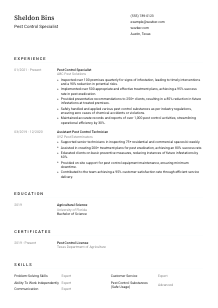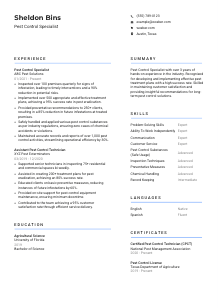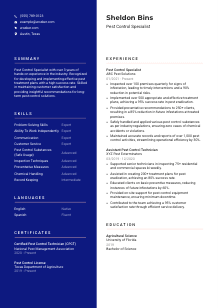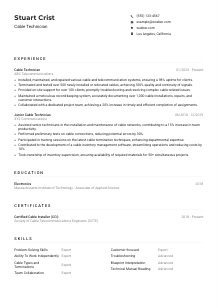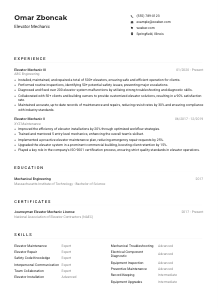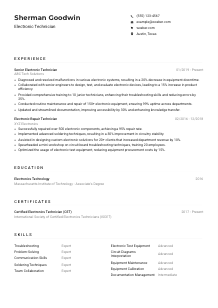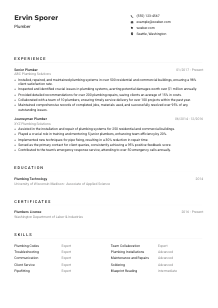Pest Control Specialist Resume Example
Battling pests, but your resume seems to buzz off in the wrong direction? Exterminate your worries with this Pest Control Specialist resume example, fumigated to perfection using Wozber free resume builder. Learn how to present your pest-fighting prowess to align with job needs, ensuring your career trajectory is as pest-free as your clients' homes!
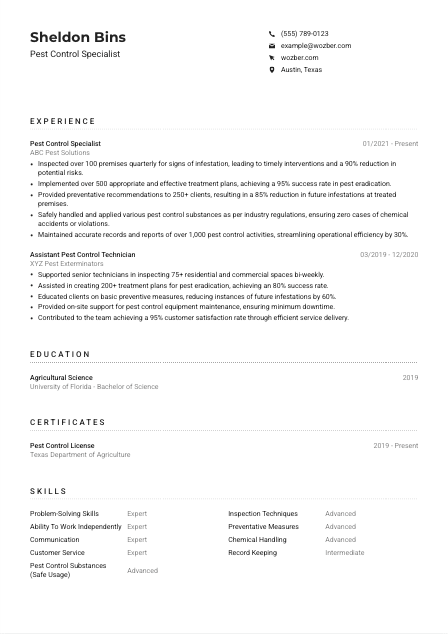
How to write a Pest Control Specialist Resume?
Hello, aspiring Pest Control Specialist! In a world where first impressions are pivotal, your resume is not just a document; it's your ambassador in the pest control industry. With the guidance of Wozber, a free resume builder tailored for crafting an ATS-compliant resume, this guide will navigate you through creating a resume that aligns perfectly with your career goals.
Embarking on this journey, let's tune your resume into an unmatched narrative, showcasing your expertise for a Pest Control Specialist role. Get ready to make pests a thing of your career's past!
Personal Details
The Personal Details section is where you make your first mark. In a few precise lines, you're about to introduce yourself in a way that resonates with the essence of a Pest Control Specialist. Follow these steps to ensure your contact details section sets a professional and targeted tone right from the start.
1. Name with Authority
Your name is your headline. Ensure it stands out by using a clear, professional font at a size that catches attention. This is where your personal brand starts.
2. Suit Up with Your Title
Just below your name, include your job title as 'Pest Control Specialist,' mirroring the position you're aiming for. This immediate alignment shows you're tailor-made for the role.
3. Essential Contact Channels
List your most accessible phone number and a professional email address. A format like firstname.lastname@email.com screams professionalism. Also, consider adding a LinkedIn profile link if you have a well-maintained one. This gives recruiters an easy way to learn more about your professional background.
4. Confirm Your Locale
Location, location, location. Mentioning "Austin, Texas," directly responds to the job requirement of being locally based. This eliminates any concerns about relocation.
5. Optional Links
If you have a professional portfolio or relevant online profiles, here's where you can subtly include them. Ensure anything you link is polished and presents you in a professional light.
Takeaway
Keep your introduction lean and meaningful. This section is your resume's handshake, setting the stage for the narrative that follows. With each detail, you're promising potential employers that you're not just a fit - you're the perfect candidate for the Pest Control Specialist role.





Experience
The Experience section is where your resume truly comes to life. Here, you illuminate your path in the pest control industry, highlighting the experiences that sculpt you into an ideal candidate. Let's map out how to reflect your pest-battling journey compellingly.
- Inspected over 100 premises quarterly for signs of infestation, leading to timely interventions and a 90% reduction in potential risks.
- Implemented over 500 appropriate and effective treatment plans, achieving a 95% success rate in pest eradication.
- Provided preventative recommendations to 250+ clients, resulting in a 85% reduction in future infestations at treated premises.
- Safely handled and applied various pest control substances as per industry regulations, ensuring zero cases of chemical accidents or violations.
- Maintained accurate records and reports of over 1,000 pest control activities, streamlining operational efficiency by 30%.
- Supported senior technicians in inspecting 75+ residential and commercial spaces bi‑weekly.
- Assisted in creating 200+ treatment plans for pest eradication, achieving an 80% success rate.
- Educated clients on basic preventive measures, reducing instances of future infestations by 60%.
- Provided on‑site support for pest control equipment maintenance, ensuring minimum downtime.
- Contributed to the team achieving a 95% customer satisfaction rate through efficient service delivery.
1. Break Down Your Battles
Analyze each requirement from the job description, like "Inspect premises regularly for signs of infestation." Match your past roles and responsibilities to these requirements, showing you're already familiar with the battlefield.
2. Highlight Roles and Victories
List each position you've held in reverse chronological order. For each, highlight your title, the company's name, and your tenure. Then dive into the accomplishments - how many premises you've inspected, eradication success rates, and any instances where you've exceeded expectations.
3. Quantify Your Impact
In pest control, numbers speak volumes. Whether it's the percentage reduction in infestations or the number of successful treatments implemented, use quantifiable achievements to showcase your effectiveness.
4. Relevant Reflections Only
Was there a time you stepped up and solved a complex infestation issue? Or perhaps you introduced a preventive measure that significantly reduced future problems? These stories matter. Stick to what's relevant to your role as a Pest Control Specialist.
5. Accord With ATS
Employers often use Applicant Tracking Systems (ATS) to filter resumes. Use keywords from the job description throughout your accomplishments. Phrases like "pest control substances handling," "safety compliance," and "client recommendations" are likely to be ATS gold.
Takeaway
Your experience section is your career storyboard. Each bullet point tells a story of challenges met and overcome, illustrating your readiness for the position. Tailor your narrative with precision, let your achievements shine, and ensure ATS compatibility for a resume that not only passes the scan but stands out to human eyes as well.
Education
In the quest for the Pest Control Specialist role, your education segment backs up your expertise with solid foundation. It's more than dates and degrees; it's a testament to your preparedness for the challenges of the industry.
1. Align Your Academic Achievements
While the job description might not have spelled out specific education requirements, listing your degree, especially if related to Pest Control or Environmental Science, validates your technical background.
2. Structure: Clear and Straightforward
Organize this section to list your degree, the field of study, and the institution's name followed by the graduation year. A crisp, uncluttered format is key.
3. Focus on Pertinence
While your degree in Agricultural Science or Environmental Studies is directly relevant, don't shy away from highlighting elements of your education that showcase skills applicable to pest control, like problem-solving or chemical safety courses.
4. Mention Noteworthy Courses
If your coursework directly relates to the job, like entomology, rodent control strategies, or safe pesticide application, make a note. Especially for early-career professionals, these details can significantly bolster your application.
5. Educational Extras
Did you lead any relevant projects or participate in clubs that honed skills valuable to a Pest Control Specialist? This is the spot to share that, showing your commitment to the field beyond classroom learning.
Takeaway
Your education section is a reflection of your professional groundwork. It reinforces your suitability and readiness for the challenges of pest control. Craft this part of your resume to be as informative as it is impressive, showcasing the academic roots of your expertise.
Certificates
Certifications are the extra badges of honor in the pest control industry, showcasing your dedication to staying at the forefront of best practices. Here's how to display your certifications in a way that catches employers' eyes.
1. Pinpoint Relevant Badges
Given the job description's emphasis, your state-specific Pest Control License and any additional certifications like the Certified Pest Control Technician (CPCT) take precedence. These directly reflect your qualifications and commitment to the profession.
2. Quality Over Quantity
Rather than listing every certificate you've ever obtained, focus on those most relevant to the pest control field. This ensures potential employers see your most pertinent qualifications first.
3. Be Precise with Dates
For certifications with expiration dates or those recently acquired, including the dates sends a message of current competency. It's a subtle way to show you're up-to-date with industry standards and regulations.
4. Never Stop Learning
The pest control landscape is always evolving, with new substances, methods, and regulations coming into play. Demonstrate your commitment to continuous professional development by seeking out and listing new certifications that keep you at the cutting edge.
Takeaway
Your certifications are a powerful testament to your expertise and dedication to excellence in pest control. By strategically selecting and presenting these credentials, you highlight your readiness to tackle the challenges of the role, positioned perfectly at the intersection of compliance and best practice.
Skills
The Skills section of your resume is your professional toolkit laid bare. It's a compelling snapshot of your abilities, tailored to show you're equipped with everything needed for the Pest Control Specialist role. Let's focus on honing this section to be as impactful as possible.
1. Matching Job Descriptors
Dive deep into the job description, identifying both explicit skills like 'strong problem-solving skills' and implicit skills such as the ability to 'work independently.' These are the proficiencies you want to echo in your skillset.
2. Prioritize Pertinence
It's not just about showcasing your skills; it's about aligning them with the job's demands. List skills that directly correlate to the tasks and responsibilities of a Pest Control Specialist, ensuring they resonate with the role's core requirements.
3. Clarity and Impact
Keep this section straightforward, avoiding an overload of information. Focus on hard skills relevant to pest control, supplemented with soft skills that highlight your interpersonal and professional competencies. This balance shows you're not only capable but also versatile.
Takeaway
The skills you list are a promise of the value you bring to the table. Precision here shows you're not just a suitable candidate; you're the ideal match for the Pest Control Specialist role. Each listed skill should serve as a beacon, drawing hiring managers closer to selecting you.
Languages
In a role like Pest Control Specialist, where communication with diverse clientele is key, your linguistic capabilities can set you apart. Let's navigate how to showcase your language skills as invaluable assets.
1. Assessing Language Needs
The job description emphasizes a "strong command of the English language." Ensure English appears first in your languages section, categorized as 'Native' to directly meet this requirement.
2. Accentuate Essential Languages
While English is a must, listing additional languages showcases your capacity to communicate with a diverse range of clients. This could be particularly advantageous in areas with a significant non-English-speaking population.
3. Rank Your Proficiency
For each language listed, clearly denote your proficiency level. Whether it's 'Native,' 'Fluent,' 'Intermediate,' or 'Basic,' these descriptors provide a quick snapshot of your communication skills.
4. Honesty is the Best Policy
Be truthful about your language skills. Overstating your abilities can lead to uncomfortable situations, while honesty sets clear expectations and builds trust.
5. The Global Perspective
Leveraging your multilingual skills can be a plus in any role, especially in a city like Austin, known for its cultural diversity. Your ability to communicate across languages might just be the unique selling point that lands you the job.
Takeaway
Your linguistic capabilities are more than just a section on your resume; they're a testament to your ability to engage and connect. In a profession that emphasizes customer service as much as technical know-how, showcasing your multilingual talents can distinctly set you apart. Flaunt your linguistic prowess with confidence; it's a tool that opens doors to new opportunities.
Summary
The Summary is your resume's opening statement, a brief but powerful introduction that captures your professional essence. For a Pest Control Specialist, it's about balancing technical skills with your ability to engage and resolve. Let's craft a summary that leaves no room for pests, or doubt, about your expertise.
1. Capture the Core
Begin with a clear, engaging statement that encapsulates your professional identity as a Pest Control Specialist. Showcase your years of experience and hint at your special capabilities.
2. Echo the Job Description
Weave in key phrases from the job description like 'strong problem-solving skills' and 'excellent communication.' This not only demonstrates your fit but also helps with ATS optimization.
3. Highlight Your Value
Mention a few of your standout accomplishments in the field. Perhaps you've developed highly effective treatment plans or are known for your customer-centric approach. Here's your chance to shine.
4. Brevity and Brilliance
Remember, the summary is your elevator pitch. Keep it concise yet compelling, providing a glimpse into the depth of your expertise and the value you bring to the role.
Takeaway
Your summary is the beacon that guides potential employers through the rest of your resume. By tailoring it to mirror the job's requirements and showcasing your unique contributions, you're placing yourself a cut above the rest. This is your moment to highlight why you're not just a candidate; you're the candidate for the Pest Control Specialist position.
Launching Your Pest Control Specialist Journey
Congratulations on fine-tuning your resume into an unmatched narrative for a Pest Control Specialist! With Wozber's free resume builder at your side, you've sculpted a document that's not only ATS-compliant but also compellingly presents your career story. Remember, your resume is a living document, evolving as you do. Keep it updated, and let it serve as a potent tool in your career advancement. The industry awaits your expertise. Ready, set, eradicate!

- Minimum of 2 years of experience in the pest control industry.
- Valid state-specific Pest Control License (if applicable).
- Familiarity with various pest control substances and their safe usage.
- Strong problem-solving skills and ability to work independently.
- Excellent communication and customer service skills.
- Must have strong command of the English language.
- Must be located in Austin, Texas.
- Inspect premises regularly for signs of infestation or potential risks.
- Determine and implement appropriate and effective treatment plans for pest eradication.
- Provide recommendations to clients on preventative measures against future infestations.
- Handle and safely apply chemicals and pesticides as per industry regulations.
- Maintain accurate records and reports of pest control activities.





